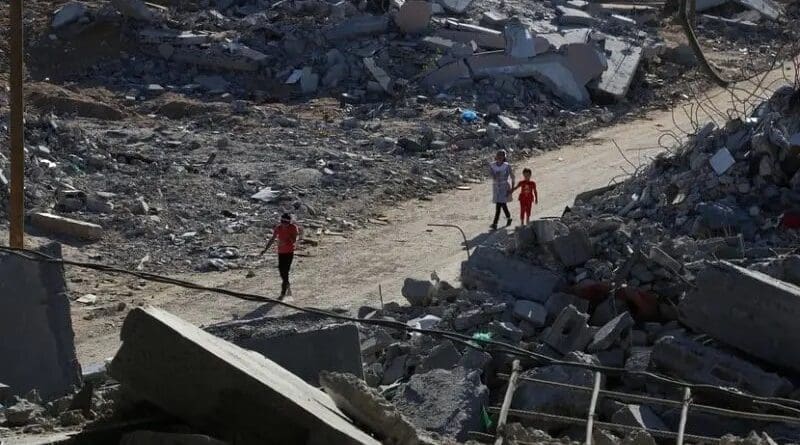Israeli-Palestinian Standoff Continues To Cloud Middle Eastern Geopolitics
Despite the emergence of other conflicts in the region, the Israeli-Palestinian standoff remains at the forefront of geopolitical debates in the Middle East. “We will not succeed if we do not realize a two-state solution, with Jerusalem as the capital, and people living side by side,” said Ayman Al Safadi, Minister of Foreign Affairs and Expatriates of the Hashemite Kingdom of Jordan.
The crises that have emerged in the last decade in places such as Syria, Libya and Yemen, plus the need for domestic reforms, continue to play second fiddle when regional leaders start discussing the geopolitical outlook.
“Everyone knows what the answer is: A Palestinian state,” Al Safadi said. “Anything short of that will not be accepted.”
Ayman Elias Bou Saab, Minister of National Defence of Lebanon, agreed that the “origin of the problem is the Palestinian-Israeli conflict. If we don’t grant the Palestinians their land, this will go on and on.” Questioned about other topics, such as the role of Hezbollah in Lebanon, Bou Saab said: “If we find a solution to the Israeli-Palestinian conflict, everything else will be easier.”
“You have to look at [regional problems] in a holistic way,” added Al Safadi. “By addressing the despair and lack of horizons [among many citizens], you have the ability to be more convincing.”
The minister also touched on the burden his country has accepted to help refugees. “There are 1.3 million Syrians in Jordan,” he said. “That is beyond our capacity.” He added that “Europe was shocked by the immigration from Syria, but it was small compared to what we have here in Jordan.”
Bou Saab stressed that the military defeat of ISIS in Syria will not put an end to the group’s ideology. He compared the current situation to the end of armed conflict in Chechnya: Al Qaeda fighters dispersed; some returned home to Lebanon and began to cause problems there. “The war may have been won in Syria, but [combatants] are heading home with their ideology. This can happen anywhere.”
Yusuf Bin Alawi Bin Abdullah, Minister of Foreign Affairs of Oman, agreed with the centrality of the Israeli-Palestinian issue, but said he does not agree with the “expectations” of some leaders in the region. “We need to look for new means so that the Middle East will become a stable region,” he said. Arabs need to understand why Israel moved to take the occupied territories, he said.
The European Union and individual European countries are unlikely to play a central role in the Middle East. They are more likely to support initiatives from the United Nations and provide humanitarian assistance, said Sigrid Kaag, Minister for Foreign Trade and Development Cooperation of the Netherlands.
She also suggested that “the institutions [in the region] have failed their own citizens. Not everything is related to the Israeli-Palestinian conflict. There are no jobs. There is no future. The public sector is bloated. [Citizens] want to know how their governments are going to address this. Leadership ultimately has to come from the countries themselves. Europe can provide support. We are not living in a neo-colonial era.”
The World Economic Forum on the Middle East and North Africa is being held at the Dead Sea in Jordan on 6-7 April in partnership with the King Abdullah II Fund for Development (KAFD). The meeting marks the 10th hosted by Jordan since it was first convened at the Dead Sea in 2003. It is bringing together more than 1,000 government, business and civil society leaders from over 50 countries.

